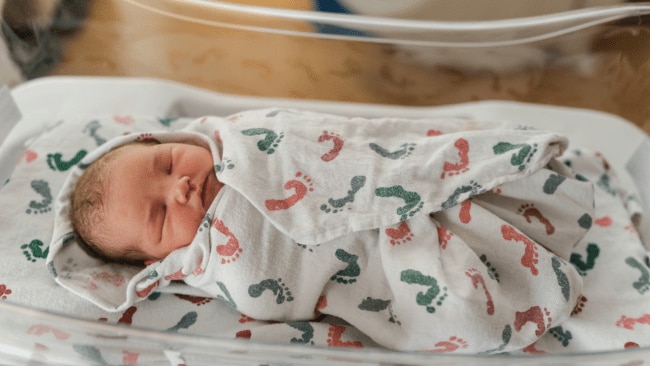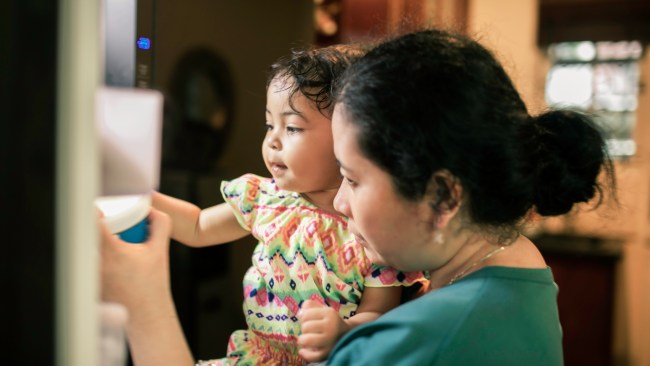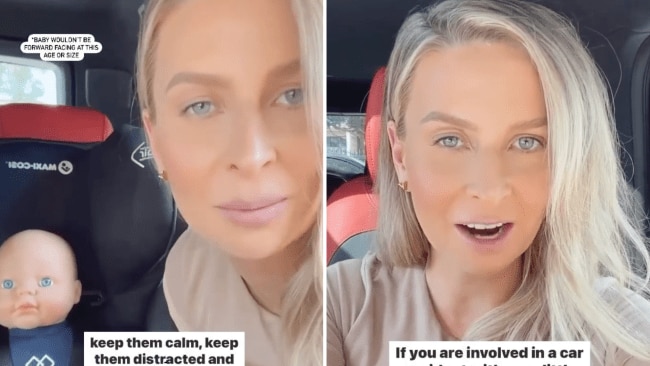'Dangerous' reason why you should rethink that Instagram birth announcement
Aussie paediatrician, Dr Golly, urges parents to avoid the social trend - for the sake of the newborn.

Parenting
Don't miss out on the headlines from Parenting. Followed categories will be added to My News.
It’s never been easier to track a person online. A simple image of a coffee on Instagram can let followers know which cafe you’re hitting up most mornings and at what time. The same goes for announcing a baby’s birth via social media.
It seems to have become a right of passage now. A baby is born and their parents upload a gorgeous photo on Instagram featuring their brand new baby’s face, name, weight and date of birth. Alongside tagging the hospital location of where the birth took place.
It’s beautiful for family and friends, but for sinister strangers, it could be used as fodder for stalking and identity theft… especially for those with public accounts.
From a simple birth announcement hackers can often scrape vital information including full name, initials, DOB and the suburb where the baby was born - key information on an eventual passport!
There is no need to panic if you have done this. Most have, including me! Hell, our parents used to pay to put these details in the local paper.
We’re all evolving our digital and social media habits as the web, AI and social media platforms evolve. This is something to keep in mind as your family grows.
Want to join the family? Sign up to our Kidspot newsletter for more stories like this.

RELATED: What you need to know about perimenopause
Locking things down
What I recommend is mindfully sharing content about your kids online and setting up your privacy settings to match you and your partner's desired level of exposure.
It’s important to talk openly and honestly about what boundaries and digital rules you want to set around your child's digital identity and exposure as a couple - before your baby arrives.
A few questions to ask each other as parents:
- Will you post pictures of your children publicly or only with close family?
- When is it OK to share location?
- Have you both updated your social media privacy settings?
- Have you both done a cull of who follows you or who you’re friends with on various platforms before the baby arrives?
Making these decisions early helps you avoid oversharing and ensures parental alignment.
If you have made the decision not to post photos or details of your kids online it’s important your extended family and friends are across these too so they can adhere too.
Introducing our new podcast: Mum Club! Listen and subscribe wherever you get your podcasts so you never miss an episode.
RELATED: The unique way parents are helping their kids manage stress
Other ways to keep your child safe
Sharing content about your baby and children mindfully is key.
I recommend skipping personal details where possible. Refrain from sharing your baby’s full name, date of birth, or health information online publicly. These details can be stored and used in ways you can’t control later.
Turn off geotagging and avoid real time or regular locations you and your baby/child visit frequently, skip location or venue check-ins at e.g. childcare, kindergarten, school, local parks or coffee shops.
If you do take and post a photo, cover up uniforms, blur out logos of any institution on clothing that could track your child to a childcare, kinder or school. Another hint is to post the photo black and white so uniform colours aren’t revealed.
Be selective about photos and think before you post. Once a picture is online, it’s there forever. AI and other technologies may use your baby’s image without your consent.
And remember to consider your baby’s future - they can’t consent to what you post. Be selective about how much of their life you put online—your baby’s privacy matters.
I completely understand the urge to share every smile and wink with close family, I love Tinybeans as it allows a tight network of family and friends to enjoy ALL the baby/family spam while protecting your child’s privacy.
Digital Nesting is something I’m really proud to promote - it’s the practice of preparing and establishing digital boundaries and safety measures for a newborn or young child before or shortly after their arrival. See all my top 10 tips for protecting your child’s e-safety from day one.
Don’t panic if you have overshared in the past. The likelihood of anything sinister happening is low, but as we learn more about the digital landscape and its capabilities, it’s important we evolve at the same pace as it does.
Don’t freak out. Stay vigilant. Be Mindful.
Originally published as 'Dangerous' reason why you should rethink that Instagram birth announcement




